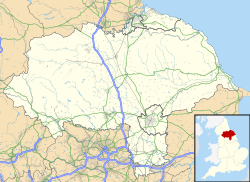| Cawthorn Camp | |
|---|---|
| North Yorkshire, England | |
 | |
| Coordinates | 54°18′00″N 0°47′53″W / 54.300°N 0.798°W / 54.300; -0.798 |
| Grid reference | SE783900 |

Cawthorn Camp (sometimes spelled "Cawthorne") is a Roman site in northeast England, about 4 miles (6 km) north of Pickering, North Yorkshire. The well-preserved earthworks outline two forts, one with an extension and a temporary camp built to an unusual plan. The earthworks date from the late 1st or early 2nd century AD. It has been suggested that they were built for practice rather than military use.
Archaeological investigation has also found indications of pre-Roman activity at the site and traces of later sunken dwellings (Grubenhäuser). J. R. Mortimer discovered a late Iron Age chariot burial here in 1905, and at least one other square barrow is known from the site.
The site was acquired by the North York Moors National Park in 1983.
References
- "OL27" (Map). North York Moors - Eastern area. 1:25,000. Explorer. Ordnance Survey. 2016. ISBN 9780319242667.
- ^ Historic England. "Cawthorn Roman forts and camp including a section of medieval trackway known as the Portergate (1007988)". National Heritage List for England. Retrieved 14 January 2018.
- Historic England. "Cawthorn (60589)". Research records (formerly PastScape). Retrieved 14 January 2018.
- Stead, I. M. (1979). The Arras Culture. Yorkshire Museum. p. 99.
- "Cawthorn Roman Camps: North York Moors National Park". northyorkmoors.org.uk. Retrieved 20 October 2024.
External links
- "Cawthorn Roman Camps" on Wikimapia
This article relating to archaeology in the United Kingdom is a stub. You can help Misplaced Pages by expanding it. |
This article about a North Yorkshire building or structure is a stub. You can help Misplaced Pages by expanding it. |